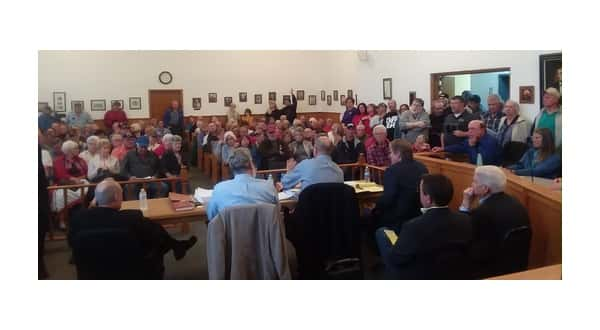
The first outburst from the audience came 14 minutes into a town hall forum Wednesday afternoon held to address citizen concerns regarding the controversial $18 annual assessment fee against each residence and business parcel to pay the debt incurred in purchasing the NABORS waste hauling operation and the local landfill.Karen Hopper was at the forum and has this report.
Listen:
The forum drew a crowd filling the courtroom of the Baxter County Courthouse, with attendees standing against the wall and spilling out into the hallway. State Representative Nelda Speaks opening the session reiterated the purpose of the meeting was to provide information, not remove the $18 fee. Speaks clarified none of the currently serving officials at the local and state level were in office when the problems with the NABORS operation began.
On hand to address citizen concerns were two representatives from the Arkansas Department of Environmental Quality, Court Appointed Receiver Geoffrey Treece, all from Little Rock, and John Verkamp, the Ozark Mountain Solid Waste District’s attorney.
For the first 43 minutes, an inpatient crowd received a review of the history of the debacle that began to unravel with the purchase in 2005 of the northern Baxter County landfill from RLH by what would become known as the six-county Ozark Mountain Solid Waste District. Receiver Treece noted the purchase was possible through legislation passed in 1989 establishing solid waste districts with the authority to issue bonds. The same legislation gave the district board the authority to impose a fee to cover expenses incurred in operating waste hauling operations and landfills.
Boards for solid waste districts are comprised of county judges and mayors of Class I cities.
Treece said the purchase was never a viable economic model, saying it was a “mess from the beginning.”
Four years after the purchase of the landfill in 2009, the solid waste district board severed its management ties with the Northwest Arkansas Economic Development District in Harrison. Receiver Treece said there had been “gross mismanagement” during the time of the NWAEDD management period.
The next significant step in the saga came in 2012 when the district defaulted on the payment of principal and interest to the bondholders and stopped trash collections. After the default on the debt, Bank of the Ozarks, as trustee for the bondholders, sued the district in Pulaski County Circuit Court.
Two years later, the district sought Chapter 9 bankruptcy protection. However, a federal bankruptcy court judge would throw the case out later in 2014 on the grounds solid waste districts were not authorized under Chapter 9. But he made a telling statement when he noted the board’s decision not to impose a service fee to improve the district’s financial health appeared to be based primarily on political concerns.
Then in April 2017, a ruling by a Pulaski County Circuit judge would set the stage for the $18 annual fee appearing on 2018 tax statements. Those fees to be collected over what could be as long as 30 years will cover the district’s obligations of $11 million of principal on the loan, $16 million to repay the state for the landfill cleanup and $1.5 for post landfill closing obligations of monitoring of leachate. The bondholders have agreed to waive collection of past and future interest on the debt.
Treece noted one of the biggest misconceptions in this debacle is that it’s more than a landfill issue, noting the district continues to offer a number of services including curbside recycling and recycling drop-off centers, electronic waste, household hazardous waste and waste tires.
He said, by statute, if a solid waste district makes services available, it can charge a service fee against each residence and business parcel. He also said by statute, payment of the bonds is a valid obligation of the solid waste district, no different than payment of a bank note.
WebReadyTM Powered by WireReady® NSI










